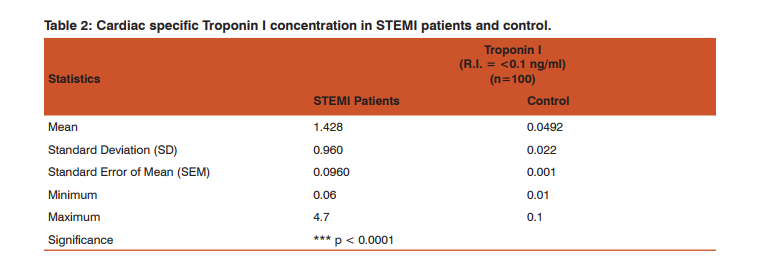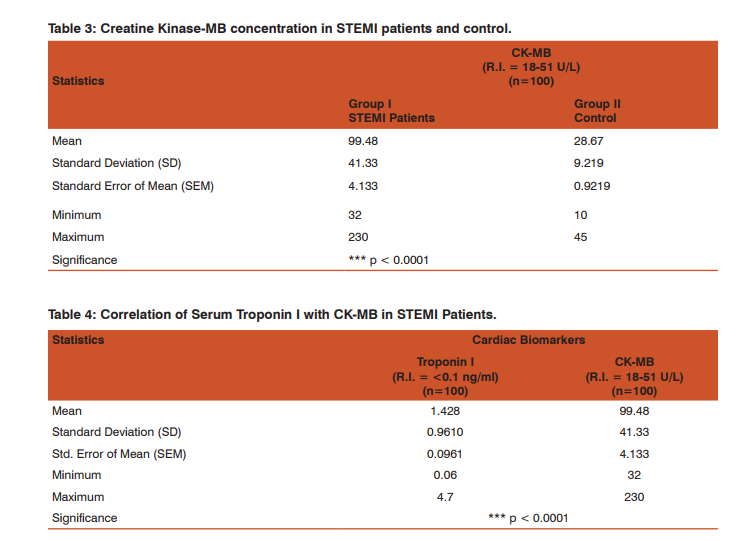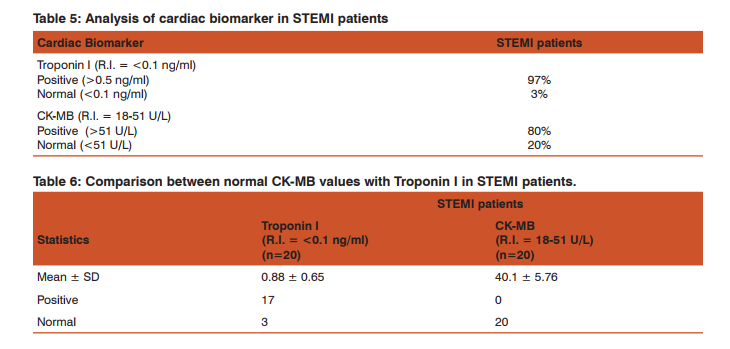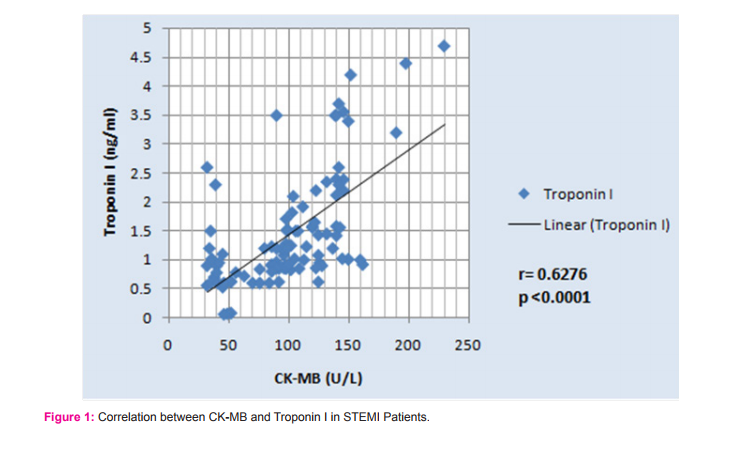IJCRR - 8(9), May, 2016
Pages: 21-25
Date of Publication: 12-May-2016
Print Article
Download XML Download PDF
COMPARATIVE ANALYSIS OF SENSITIVITY AND SPECIFICITY OF CARDIAC SPECIFIC TROPONIN I AND CK-MB FOR DIAGNOSIS OF ST SEGMENT ELEVATION MYOCARDIAL INFARCTION
Author: Sandipkumar R. Patel, Hariom Sharma, Bhavika Vanani
Category: Healthcare
Abstract:Background: Study is designed to see correlation of cardiac specific Troponin I and Creatine Kinase-MB level to diagnose ST segment elevation myocardial infarction. Aim and Objectives: To access the diagnostic importance of cardiac specific Troponin I over Creatine Kinase-MB in patient of ST-segment elevation myocardial infarction. Materials and Methods: A comparative study was carried out in 100 patients, having ST segment elevation myocardial infarction. A group of 100 normal healthy individuals, age and sex matched from the same population served as controls. Troponin I and Creatine Kinase-MB levels were estimated in both the groups. Results: Results of present study shows that cardiac specific Troponin I and CK-MB levels were significantly higher in STEMI patients compared to healthy subjects with 'p' value of < 0.0001. Pearson's correlation test show positive correlation between Troponin I and CK-MB in STEMI patients. 17% of STEMI patients had normal CK-MB levels, but there Troponin I levels were elevated significantly. Conclusion: Troponin I level is more specific for confirming the diagnosis of acute myocardial infarction where CK-MB fails to do so.
Keywords: Troponin I, ST-segment elevation myocardial infarction (STEMI), Creatine Kinase – MB (CK-MB)
Full Text:
INTRODUCTION Acute myocardial infarction occurs when coronary blood flow decreases abruptly after a thrombotic occlusion of a coronary artery previously affected by atherosclerosis and is the most common contributor of morbidity and mortality worldwide. Slowly developing, high-grade coronary artery stenoses do not typically precipitate ST-segment elevation myocardial infarction (STEMI) because of the development of a rich collateral network over time. [1] In India, incidence of cardiovascular diseases was about 7% in 1970 and increased up to 32% in 2011 and 31.7% of deaths occur due to myocardial infarction. The huge burden of coronary artery disease in Indian subcontinent is the consequence of large population and high prevalence of cardiovascular risk factors like smoking, tobacco chewing, alcohol, low fruit and vegetable intake, lack of physical activity, obesity, high blood pressure, abnormal lipid levels and diabetes. [2]
Cardiac specific troponin I is present in three isoforms namely cardiac, skeletal slow-twitch and skeletal fast-twitch, encoded by three separate genes. However, cardiac specific Troponin I is expressed as a single isoform in adult heart but not in skeletal muscle. [3] Creatine Kinase, which is a cytosolic carrier protein for high-energy phosphates, has three isoenzymes: CK-MM (skeletal muscle), CK-BB (brain), and CK-MB (heart and skeletal muscle). Creatine Kinase - MB is most abundant in the heart. [4] Jagannadha Rao Peela et al. reported that troponins have ushered in a new era of highly specific and sensitive cardiac markers for diagnosis of myocardial infarction.[5] So, the present study was designed to measure and compare the changes in Creatine Kinase – MB and Troponin I level in patients of ST-segment elevation myocardial infarction.
MATERIALS AND METHODS The present study was conducted at Department of Biochemistry, Government Medical College and Sir Takhtsinhji General Hospital, Bhavnagar in which 100 cases of ST-segment elevation myocardial infarction were included. The myocardial infarction patients were primarily diagnosed by cardinal symptoms like chest pain and 12-lead ECG (Echocardiogram). A group of 100 normal healthy individuals, age and sex matched from the same population served as controls. Inclusion criteria were both male and female above 18 years of age. Exclusion criteria were age less than 18 years and patients, not willing to give informed consent.
The study was reviewed and approved by Human Ethics Committee of Government Medical College, Bhavnagar. Venous blood sample was collected in plain vacutainer from patients of ST-segment elevation myocardial infarction and from healthy controls and after centrifuging, were analyzed for CK-MB and Troponin I. CK-MB was estimated by using Fully auto analyzer I-Lab 650. Troponin I was estimated by using iMark Micro plate Absorbance Reader (Elisa Reader). Quality controls were done before analyzing both parameters. Methods of estimating CK-MB: Immuno-Inhibition method, Troponin I: ELISA (The enzyme-linked immunosorbent assay) method.
STATISTICAL METHODS Results of the present study were analyzed by using Graph Pad in Stat version 3.0. In data analysis, comparison of these parameters for ST segment elevation myocardial infarction patients were carried out by applying unpaired t-test and their correlation were studied by applying Pearson Correlation test. Interpretation of the test result was done according to p value (p < 0.05 – significant, p < 0.001 – highly significant and p ≥ 0.05 – not significant).
RESULTS Present study includes 100 healthy controls and 100 STEMI patients. Control subjects include 34% females and 66% males, while STEMI patients comprise 23% females and 77% males. Mean age in STEMI patients was 47.33 ± 9.949 years which include 31 patients (31%) between30-40 years, 36 patients (36%) between 41-50 years, 25 patients (25%) between 51-60 years and 8 patients (8%) between 61-70 years of age. The maximum number of patients belongs to age group between 41-50 years. In healthy control mean of age was 46.66 ± 13.10 years which include 44 patients (44%) between 30-40 years, 16 patients (16%) between 41-50 years, 26 patients (26%) between 51-60 years and 14 patients (14%) between 61-70 years of age.
The maximum number of patients belongs to age group between 30-40 years. (Table – 1) The mean level of Troponin I was 1.428±0.960 ng/ml in STEMI patients and 0.0492±0.022 ng/ml in healthy subjects. The mean level of CK-MB was 99.48±41.33 U/L in STEMI patients and 28.67±9.219 U/L in healthy subjects. STEMI patients have significantly higher Troponin I and CK-MB level than healthy subjects. (Table – 2, 3) Troponin I and CK-MB levels in STEMI patients were statistically highly significant with ‘p’ value of <0.0001. Pearson’s correlation test shows significant positive correlation (0.6276) between Troponin I and CK-MB in STEMI patients. (Figure 1, Table – 4) This study shows that 80% patients of STEMI have significantly higher Creatine Kinase - MB level and 97% patients of STEMI have significantly higher level of Troponin I. In 20 STEMI patients, CK-MB level was in the normal range (mean: 40.1 ± 5.76 U/L), out of this 17 patients had significantly high Troponin I level (mean: 0.88 ± 0.65 ng/ml), whereas 3 patients had normal Troponin I level in this group. (Table 5, 6)
DISCUSSION Myocardial infarction is the most common contributor of morbidity and mortality worldwide. [2] India has the highest burden of acute coronary syndrome in the world. Patients with acute coronary syndromes in India tend to be young and from low socioeconomic groups, and to have a higher rate of STEMI than do patients in developed countries. [6] The mean age of STEMI patients was 47.33±9.949 years (Table -1). Serum Troponin I and CK-MB levels were significantly higher in STEMI patients in comparison to healthy subjects (Table – 2, 3). A positive correlation was observed between Troponin I and Creatine Kinase – MB in STEMI patients with a Pearson correlation coefficient of 0.6276 (Figure- 1)(p<0.0001). This study shows that 80% of total 100 patient of STEMI have significantly higher Creatine Kinase - MB level while 97% of patient of STEMI have significantly higher level of Troponin I.
However, 17 % of patients who had an Acute Myocardial Infarction had CK-MB levels not significantly different from controls. In the same patients Troponin-I levels had been elevated. Hence, Troponin I is more specific for confirming the diagnosis of AMI. Troponin I have emerged as sensitive and more cardiac specific clinical indicator for diagnosis of AMI. This is consistent with the studies conducted by previous researchers. S Joarder et al. [7] reported that Serum cTnI is better and more characteristic biomarker than CK-MB for risk prediction and prognosis evaluation in AMI patients. Allan S. Jaffe et al. [8] reported that Cardiac troponins (I or T) are the preferred markers for the diagnosis of myocardial injury.
CONCLUSION From the present study it is concluded that cardiac specific Troponin I and Creatine Kinase - MB levels were significantly higher in STEMI patients in comparison to healthy subjects. However, in certain STEMI patients CK-MB show less predictive value as compared to Troponin I, therefore Troponin I can be used as a more sensitive and specific marker to detect myocardial infarction.
ACKNOWLEDGEMENT Authors are thankful to all participants of the study and to the technical staff of biochemistry laboratory of Government Medical College, Bhavnagar for their help and support during the study. Authors acknowledge the immense help received from the scholars whose articles are cited and in cluded in references of this manuscript. The authors are also grateful to authors / editors / publishers of all those articles, journals and books from where the literature for this article has been reviewed and discussed.





References:
1. Harrison’s Principles of Internal Medicine, Volume 1, 18th edition, chapter 245: ST-Segment Elevation Myocardial Infarction. McGraw Hill Education; p. 4082.
2. Sushma Pandey, Suresh Pandey, Purushottam Jhanwar, Anshul Jhanwar. A prospective study of Myocardial Infarction patients admitted in a tertiary care hospital of south-eastern Rajasthan. Int J Biol Med Res. 2012;3(2):1694-96.
3. Gary Ross, Frank N. Bever, Zi Uddin, Elaine M. Hockman. Troponin I sensitivity and specificity for the diagnosis of acute myocardial infarction. JAOA 2000;100:29-32.
4. Harper’s Illustrtaed Biochemistry, 28th Edition, chapter 7:Enzymes: Mechanism of Action, pp 127-28.
5. Jagannadha Rao Peela, Abdalla M. Jarari, Abdul Hai, Avinaash K. Rawal, Shoba Devi Kolla, Shakila Sreekumar et al. Cardiac Biomarkers: The Troponins and CK- MB. Ibnosina Journal of Medicine and Biomedical Sciences 2010;2(5):190-97.
6. Denis Xavier, Prem Pais, P J Devereaux, Changchun Xie, D Prabhakaran, K Srinath Reddy et al. Treatment and outcomes of acute coronary syndromes in India (CREATE): a prospective analysis of registry data. Lancet 2008;371:1435–42.
7. S Joarder, M Hoque, M Towhiduzzaman, AF Salehuddin,N Islam, M Akter et al. Cardiac Troponin-I And CK-MB for Risk Stratification in Acute Myocardial Infarction (First Attack): A Comparative Study. Bangladesh J Med Biochem 2011;4(1):10- 15.
8. Allan S. Jaffe, Jan Ravkilde, Robert Roberts, Ulf Naslund, Fred S. Apple, Marcello Galvani et al. It’s Time for a Change to a Troponin Standard. Circulation 2000;102:1216-20.
|






 This work is licensed under a Creative Commons Attribution-NonCommercial 4.0 International License
This work is licensed under a Creative Commons Attribution-NonCommercial 4.0 International License